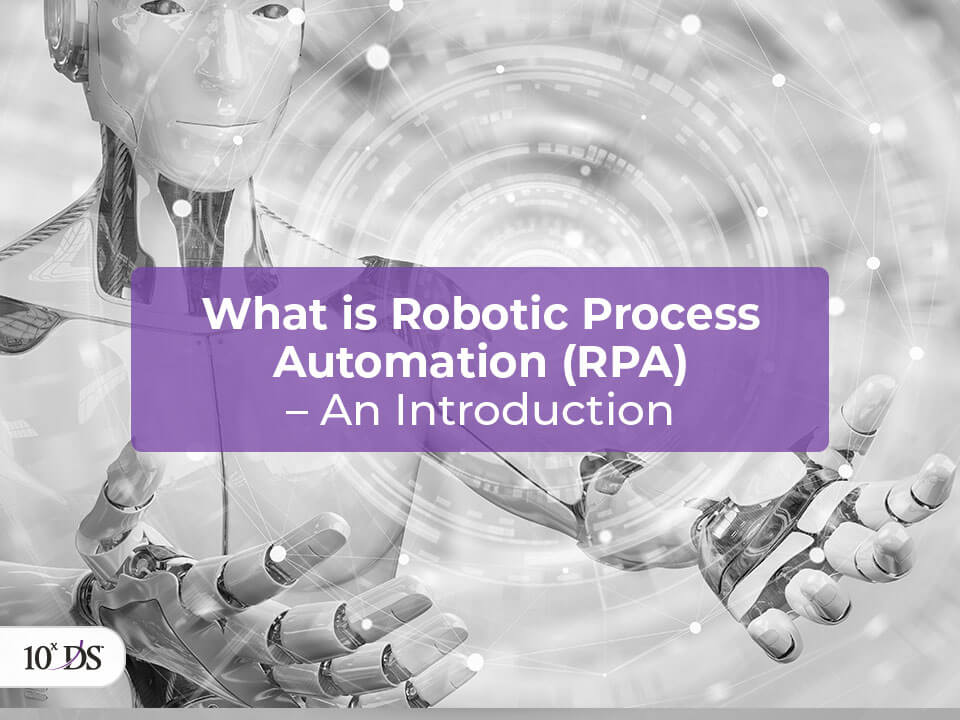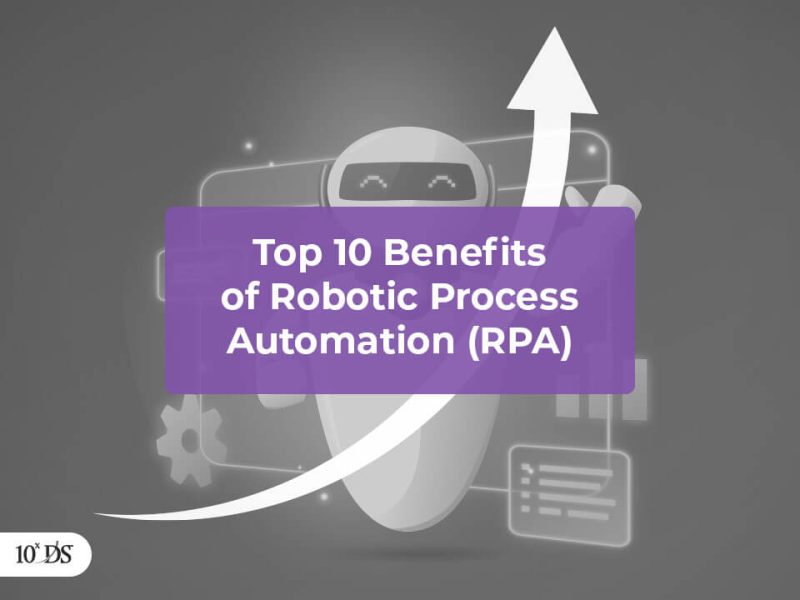
What is Robotic Process Automation (RPA) and Why it matters?
RPA is one of the most trending emerging technologies in the business world. RPA bots are capable of working on large amounts of data and consuming less time and cost.
The RPA market share will reach $1.7 billion in 2019 and $2.9 billion by 2021 according to Forrester 2019 predictions. RPA software bots will be able to perform tasks equal to the output of 140 million FTEs by 2025 as estimated by researchers at Hadoop.
RPA has the potential to transform processes in every industry, helping companies to lower overheads and gain greater return of investments.
What is Robotic Process Automation
Robotic Process Automation (RPA) is a technology and approach facilitating the use of software to automate mundane, high-volume, rule-based and repeatable tasks previously performed by humans. It is non-invasive and can be integrated without changing the existing enterprise IT landscape of any organization.
RPA makes use of specialized computer programs known as software bots to automate well defined and repetitive business tasks. RPA software bots utilize the same user interface as used by humans to manage data and activities in businesses. It is a system used to increase the efficiency and effectiveness of business processes by reducing human errors and administrative overheads.
RPA bots can work as company’s virtual agents, eliminating highly time-consuming and laborious repetitive tasks, freeing human workforce for more value-added strategic, creative and innovative initiatives. Robotic Process Automation is an adaptable, scalable technology that can be applied to many different industries and functions.
How Robotic Process Automation work
RPA can automate various processes without making changes in the existing systems. Here are some of the activities that can be carried out by RPA:
1. Log into applications
2. Connect to system APIs
3. Read and write databases.
4. Open e-mails and attachments.
5. Moving files and folders
6. Doing calculations
7. Extract and process content from files.
How to identify processes relevant to RPA
1. Repetitive process: Processes that include a high degree of repetition that are more prone to human error.
2. High volume process: Processes that have high transaction volume and high frequency which mostly run daily, weekly or on a monthly basis.
3. Rule driven: Processes based on clear processing instructions and decision making based on standardized rules.
4. Low variable outcomes: Processes with a low rate of variable outcomes needing automation due to complex human exception handling.
5. Measurable benefit: The cost savings or benefits gained by the process after automation can be expressed in terms of higher accuracy, reduced costs, higher productivity and more.
What are the Benefits of RPA
1. Improved productivity
RPA bots automate non-value-added activities, handling large data volume, enabling enhanced performance. The bots perform tasks at a much better speed 24/7/365 without downtime, significantly increasing productivity.
2. Better accuracy and compliance
RPA bots are programmed to follow rules and they operate at high accuracy levels without getting tired. The bots make the entire process error-free, efficient and accurate
3. Reduced operational costs
RPA bots are cost-effective compared to the equivalent human workforce, significantly reducing overhead expense.
4. Scalability and flexibility
Additional robots can be easily deployed with a lower cost to meet business demands.
5. Cross-platform compatibility
RPA bots can be used to automate processes across various platforms and industries.
6. Non-invasive Technology
RPA is non-invasive as it works on the existing infrastructure for the automation process. This helps in lowering administrative overheads.
7. Faster implementation and ROI
RPA implementations are quick compared to other automation projects, gaining a faster return on investments.
What Industries use RPA
Robotic Process Automation is apt for improving efficiency and effectiveness and are used across all industries. Here are the top industries that are leveraging RPA technology to streamline processes and drive growth.
1. Banking and Financial services
Banking and Finance industry has ideal process candidates for Robotic Process Automation such as Regulatory reporting, marketing, sales and distribution, bank servicing, payment operations, lending operations, back-office operations, enterprise support and others. Implementing RPA can ensure secure transactions, personal data security, faster processing, compliance of rules and regulations, and higher accuracy.
2. Healthcare
Exponential technologies such as RPA, Intelligent Automation, Artificial Intelligence (AI), Machine Learning (ML) and others are driving significant shifts in everyday healthcare settings to enhance the patient experience. These improvements address some of the areas of frustration in the healthcare industry such as Patient Experience, Medical Transcription, Smart Billing, Insurance and Claims, Clinical Decision Support, Optimizing Staff Utilization, and more. RPA can help streamline patient scheduling, patient data management processes, customer service and others.
3. Insurance
The insurance sector faces a severe problem of a large workforce engaged in routine and monotonous manual work and RPA would be able to streamline processes efficiently, significantly reducing errors and help speed up processes. Some of the ideal process candidates include Customer On-boarding, Claims Processing, Data Security and Integrity, Reporting and Compliance and more.
4. Telecommunications
The Telecom industry is perfectly suited to adopt RPA, having an overwhelming number of back-office processes. Customer reassignment, renewals, credit checks, order processing, unlatching, porting, customer on-boarding in CRM from forms, and customer dispute resolution are some of the process candidates.
5. Manufacturing
In the manufacturing industry, RPA implementation can strengthen supply chain activities and day to day functions such as invoicing, accounts receivable, accounts payable and others.
6. Logistics and supply chain
Companies can lower prices and increase efficiency by automating repetitive processes. Logistics and supply chain companies can make use of RPA for invoicing, scheduling and tracking, inventory control, order processing, payments and others.
7. Law and Compliance
These days data breaches are creating critical issues for many large firms. To reduce data breaches and to better secure personal data, several countries have introduced stringent laws. RPA helps streamline the compliance processes, safeguarding the organizations against potential breaches.
8. Retail sector
In an ever-growing e-commerce marketplace, there are several repetitive processes that can be easily automated using RPA and the efforts of the human workforce can be better aligned for more creative, innovative and strategic tasks.
9. Oil and Gas
Oil and Gas companies can gain efficient cost controls by optimizing operational performance leveraging emerging technologies like RPA. Many organizations have started adopting automation in the core O&G processes – Upstream, Midstream and Downstream for enabling greater value and thus paving the way for digital transformation.
Why it’s the right time to implement RPA
This is the right time for any organization to jump on the RPA and Intelligent Automation bandwagon! In this highly competitive world, every company is looking for innovative solutions to help them gain greater productivity and faster ROI. Robotic Process Automation is one of the most trending and useful software revolutionizing process efficiencies, offering significant benefits such as improved productivity, better customer service, greater accuracy and more.
Adopt RPA in your Digital Transformation Journey
10xDS is driving digital transformation by leveraging our vast experience, expertise, and advanced RPA and Intelligent Automation COE to optimize processes for clients across a wide range of industries and functions.
Jumpstart your Digital Transformation journey with 10xDS RPA services today. Want to gain further insights into our RPA and Intelligent Automation services? Talk to our Automation Experts!


